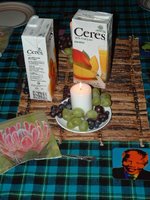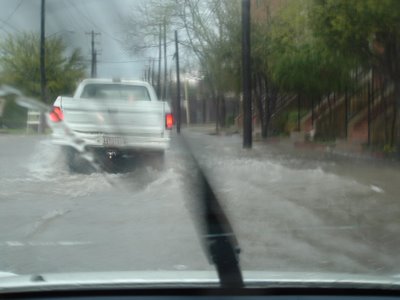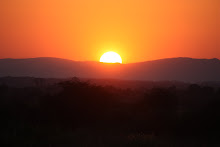 “Something broke the place where the rain is born
“Something broke the place where the rain is born
Something stole the promise from the light of dawn”
– Johnny Clegg and Savuka
I am an African and I am white.
I am the fifth or sixth generation of Afrikaners living in a unique land as one of eleven people-groups affectionately known amongst ourselves as The Rainbow Nation. When Americans see my braided blonde hair and hear my mother tongue they often insist on seeing me as either a Dutch, German or British immigrant but I am African. I know no other home than where the thundering summer rains envelope tall office blocks and rolling hills of grasveld alike in the late afternoons.
Walking home barefoot from our primary school to the same house where my parents live today, my brother and I were caught in just such a storm as we had the last ten of our thirty minute walk to go. Part of our public educational system included regular evacuation-drills in case of fire, bombs or terrorist attacks. Up until the early-nineties, two of the four countries which bordered us―Angola and Mozambique―had Marxist governments and our dad spent time away defending the border during the Bush War when we were much younger. At the age of four or five, Mom and I went to fetch him at an airport where I drank chocolate milk from a yellow plastic cup that looked like the head of a cow.
Seeing military vehicles on a regular basis wherever we drove to far places kept my innocent mind safe. I remember crying whenever I managed to stay up until midnight watching the television broadcast end with our country’s anthem playing while I saw the same bronze statue with our flag in the background. I must have been older then because I could recognize the endless words scrolling across the flickering screen as names of men or boys.
Dad showed us how to wave a special hand-sign to the uniformed soldiers to make them smile, as they walked with their big brown bags over their shoulders along the road on our way to visit my mom’s parents. They lived three hours’ drive from us half way to the Zimbabwean border. Grandpa Phil quit going to school in order to work and pay for his younger siblings’ education. When he married Granny Max he adopted her two disabled sons and took care of them at home for forty years. In this family, I learnt how to write stories, feed wild birds and speak English. When we were eating a meal at the dining table, she used to ring a little bell to call the black lady who helped her cook in the kitchen. When she died, that copper bell ended up in our kitchen cupboard but we have never used it.
My dad was a civil engineer and designed roads and bridges. In our family, we covered a lot of distance into all sorts of uncharted territories. For the first fourteen years of my life, I had never driven over a bridge crossing a river with any water in it. South Africa suffered its worse draught during the twentieth century from the mid seventies to the late eighties. We seriously needed some rain.
My dad’s dad was an important policeman―a giant with silver white hair and light blue eyes who solved murders and was one of the State President’s bodyguards. They lived in the same town as we did and we would visit them often. He used to play the piano and sing many songs about our forefathers and their folklore. He spoke Afrikaans, English, and two local black languages called Sotho and Zulu. Not even the black policemen could tell if it was a white man talking or not. As head of the Criminal Investigation Department of the country in the fifties, he had earlier arrested the leader of an underground, Pro-Nazi resistance group but after being involved in the Rivonia Trail during the sixties where Nelson Mandela was found guilty of treason, he resigned.
His wife wanted to become a lawyer but the university informed her after her first year that women were not allowed to learn anything except how to be a nurse or a teacher. So she became a teacher. After having her three boys she continued to study sociology and later rebelled against the system by means of her doctoral thesis in which she argued for working women to be taxed separately instead of keeping them from employment by adding their income to their husband’s, increasing their taxes.
Besides the weekly reminder to pray for rain, the reality of my childhood existed within the boundaries of international sanctions, living in houses where steel burglar bars covered all window-openings and remembering not ever to leave clothes outside at night on the washing-line to dry because it would be stolen. I was not shocked by black mothers nursing their babies in public or seeing black men relieve themselves against the neighbors’ walls because it happened all the time. But still, I have so many fond memories of sitting together on the grassy sidewalks outside our home listening to the foreign clicking-sounds and musical rhythms of our domestic servant visiting with her friends from the neighborhood. Feeling safe wherever I walked with her to the café making sure we were back by five o’clock when she had to start preparing dinner for us.
The general impression in my mind of that time in our country was that everybody in the world hated us for some reason. This prevented us from participating in the Olympics and any international sport-team who visited us had some variation of the word rebels in their name.
“A desert is a place without expectation.” – Nadine Gordimer
As a budding adolescent, I realized that something far more serious was wrong in my country when I discovered the reason why my favorite band―U2―did not want to tour our country at the time when they released their Joshua Tree album. Before that moment, I had never registered the word Apartheid.
Considering the hostile history between Boer and British, perhaps my unusual mix of family lineage made me less sensitive to differences. Maybe becoming a teenager was just far more important than why black people were blowing up power lines, setting each other on fire in Soweto and going to work in separate busses every day.
Growing up under such social tension and militarism engrained in me a great respect for discipline, rules and general order. At the same time my rebellious gene pool stemmed from stubborn bloodlines running down into my heart all the way from Germany and Holland. Somehow Africa had seduced me more than what conservatist propaganda could frighten me with. I loved my country and wanted to behave like a patriot but it felt like I was missing out on something important.
The thunder had begun grumbling very softly in the distance but you could smell the rain in the air already.
By the time I turned eighteen, I had read several works of banned novelists that I dug up on my father’s bookshelves. I joined the editorial team of our campus newspaper as a first year architecture student at the University of Pretoria―a traditional white Afrikaans institution where both my parents had studied. As a press photographer I had access to many forums and public events where multi-racial interaction occurred. During one lunch hour we climbed up on to the roof of our building and watched a black student organization protest down below, terrified by the sound of pounding feet and ululating voices.
It was 1992 and the undeniable signs of a miracle shone everywhere. Mandela was free. Communism had failed. CODESA―Convention for a Democratic South Africa was working. The Old South Africa stood divided about ceding white control to a volatile group existing of nine different black tribes. The result of the first election I participated in, gave all South Africans the right to vote. My tiny voice rang out in the 68.6 percent of white Afrikaners who wanted to be integrated with the rest of our countrymen and women who shared so many aspects of our daily lives, yet remained strangers, humiliated by our arrogance.
Two years later I felt God’s hand still working this miracle as I stood inline outside the gate of my primary school―side by side with many of the same black faces who visited with me as a little girl on our sidewalk―at our local voting station. Torn between mixed emotions of fearing radical sabotage and the euphoria of finally experiencing an unimaginable liberty in stepping into the unknown together as a newborn nation, we patiently stood sharing umbrellas and cold drinks. We felt proud but unaware that our separate hearts could endure far more extreme passions before they would be forged together into one.
This miracle continued as we celebrated President Nelson Mandela’s inauguration. I suspect that everybody secretly held their breath for the next four years to see if what was happening would last beyond the brightly colored ceremonies. We had a new flag and anthem: Nkosi Sikelele ‘I Afrika―God bless Africa. Each of its four verses sung in one of our nine official languages.
I think I finally exhaled in relief when South Africa won the Rugby World Cup in 1995. My new black president, wearing a green and gold rugby-jersey looked exactly like the most conservative Boerseun would, showing up for this sacred ritual in the Afrikaner culture. He danced over our victory with a smile that refused to leave his gentle face. He associated himself with the one part of the white culture where no black man had ever dared to go. Amidst the smell of spilt Castle Lager and boereworsrolls, he exemplified African community to every South African on that unforgettable winter afternoon, called Ubuntu―I know who I am because we know who we are.
We had become one people. Simunye―we are one. But our unity would soon endure a baptism of fire as The Truth and Reconciliation Commission induced a two year labor of confession, forgiveness, and an irreversible loss of ignorance.
I stayed on the sixth floor of our apartment building and my bedroom faced north toward the residence of the presidency and government―the Union Buildings. On one particular afternoon as the relentless African sun moved past my window into the west, I listened to the live court hearings over the radio. Hearing a Zulu mother beg a policeman to tell her what happened to her teenage son whom he had dragged from her arms many years ago, I stood staring at those buildings blur until there was no more orange light over the capital.
I believe that every South African mourned a loss of some kind during those years. If ever fallen humanity came close to looking evil straight in the eye, we did. In exposing the lie so many believed to be the truth behind government-indorsed policies and religiously-supported abuse, we took ownership of our sins. We stopped demanding rights and took up our responsibilities. We committed ourselves to one another as we started walking together―barefoot again, along a new road heading toward healing and hope.
A decade later I still watch films like In my Country and Red Dust weeping through most of their familiar sights and sounds. But now these tears are like the summer rains that fall while the sun shines. They are necessary to make the rainbows appear that remind me of my country and a promise never to allow such evil to ever destroy us again.
“And before your very eyes the sun breaks through. You see wild bushwillows bursting from banks and fluitjiesriet flittering out finches. In still hippo-pools, soundless rings slip from fish leaping into the sun. The rain clutches you tightly. It holds you. It hurts you. As if the rain has snipped the wire that draws your insides together.” – Antjie Krog
My name is Leani Wessels and I am South African.



